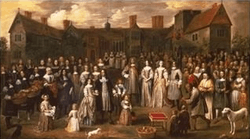Tichborne Dole

The Tichborne Dole is a traditional English festival of charity which is held in the village of Tichborne, Hampshire, during the Feast of the Annunciation. The festival is centered on the handing out of donations of flour, which have been blessed by the local parish priest, from the front of Tichborne House.
The festival dates back to the 12th century (circa 1150) and was started by Lady Mabella Tichborne who, on her death bed, instructed that a donation of farm produce be made to the poor each year. Presently, the terms of the Dole stipulate that adults from the parishes of Tichborne and Cheriton are entitled to claim 1 gallon of flour, and children half a gallon each.[1][2][3][4][5]
The Crawls
According to local tradition, Lady Tichborne's husband, Sir Roger Tichborne, did not approve of her charity and agreed to her bequest on the condition that the Dole consisted only of produce from land that she was able to encircle under her own power while carrying a burning torch in her hand. Lady Tichborne, who was in poor health, is said to have successfully crawled around a 23-acre (93,000 m2) field before the torch went out. The land which she is said to have encircled is known locally as the Crawls.[1][2][3][4][5]
The Curse
The story of the Dole holds that Lady Tichborne placed a curse on it to ensure that her request would never be abandoned. According to the curse, if the Dole were to stop, the Tichborne family would bear seven sons, then seven daughters, leading to the family's name being lost and the house falling into ruins.[1][3][5]
The Dole continued from the time of Lady Tichborne's death until 1796, when disturbances during the handing out of the Dole lead to local officials ordering it to cease. The Baronet at that time, Sir Henry Tichborne, 8th Bart. was the eldest of seven sons. He had seven daughters but no sons. However his brother Edward did have a son, Henry, born in 1829 but he died in 1836 aged six years old. At this point, fearing that the curse had come to fruition, the Dole was resumed. Edward became the 9th baronet but had no sons. Another of the seven brothers, James, became the 10th baronet. He had two sons, Roger, who was born in 1829 (before the Dole was resumed) and Alfred, born in 1839 (after the resumption of the Dole). Roger was shipwrecked and lost at sea (1854) and Alfred eventually became the 11th baronet on his father's death in 1862. Sir Alfred died in 1866 leaving his wife pregnant with a son, Sir Henry Doughty-Tichborne, 12th Bart.
The dole and curse set the groundwork for the infamous Tichborne Claimant trial of the 19th century.[1][3][5]
- The Seven Sons
- Sir Henry Joseph Tichborne, 8th Bt (1779-1845)
- Capt Benjamin Edward Tichborne, EICS (1780-1810 in China)
- Sir Edward Tichborne-Doughty, 9th Bt (1782-1853)
- Sir James Francis Tichborne, 10th Bt (1784-1862)
- John Michael Tichborne (1788-1806) Died at Vellore, near Madras, India
- George Tichborne (1789-1802)
- Roger Robert Tichborne (1792-1849) married Rebecca Nunez, no male issue
- The Seven Daughters of Sir Henry Tichborne, 8th Bt and Anne (daughter of Sir Thomas Burke, 1st Bt)
- Eliza Anne Tichborne, married the 11th Baron Dormer
- Frances Catherine Tichborne, married 11th Baron Arundell of Wardour (3rd wife, married 1829, died 1836)
- Julia Tichborne, married firstly (1830) Charles Talbot, secondly Washington Hibbert
- Mary Tichborne, died 1827
- Catherine Caroline Tichborne, married William Greenwood
- Lucy Ellen Tichborne, married Colonel John Towneley
- Emily Blanche Tichborne, married firstly John Bennett, secondly Matthew Higgins
Media
The Dole was the subject of a 1926 silent movie written by George Banfield and directed by Hugh Croise,[6] and a 1671 painting; entitled "The Tichborne Dole" by Gillis van Tilborch.
References
- ↑ 1.0 1.1 1.2 1.3 The Tichborne Dole, Historic UK (2007-07-28)
- ↑ 2.0 2.1 Legacies - UK history local to you - Southampton: The Tichborne Dole, BBC (2007-07-28)
- ↑ 3.0 3.1 3.2 3.3 Tichborne Dole, Strange Briton (207-07-28)
- ↑ 4.0 4.1 The Tichborne Dole (2003-03-26), Independent Catholic News (2007-07-28)
- ↑ 5.0 5.1 5.2 5.3 Hendricks, George D (1996) "Curse of Tichbornes Finally Comes to Pass", Western Folklore, V28#2. pp. 146-147
- ↑ The Legend of Tichborne Dole (1926), IMDB (2007-07-28)